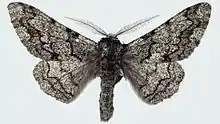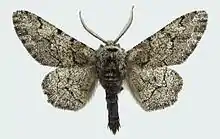Biston robustum
Biston robustum is a species of moth belonging to the family Geometridae. This is a large moth and is known in its native range as the giant geometer moth. It is related, and generally similar, to the famous and widespread Peppered Moth.
| Biston robustum | |
|---|---|
 | |
| Male | |
 | |
| Another Male | |
| Scientific classification | |
| Kingdom: | Animalia |
| Phylum: | Arthropoda |
| Class: | Insecta |
| Order: | Lepidoptera |
| Family: | Geometridae |
| Genus: | Biston |
| Species: | B. robustum |
| Binomial name | |
| Biston robustum Butler, 1879 | |
| Synonyms | |
| |
The species is found in China (Shandong, Shaanxi, Shanghai, Jiangsu, Jiangxi), Taiwan, Japan, Russia, North Korea, South Korea and Vietnam.[1]
This species has recently gained attention due to the discovery of its use of chemical mimicry to avoid predation by ants. The larva of this species, in common with many other geometrids, uses visual mimicry, strongly resembling a twig of its host plant. Recent studies have shown that it also uses chemical mimicry, storing chemicals from its food in its cuticle so that ants are largely unable to distinguish it from a twig, even after making contact with their highly sensitive antennae. Ants foraging for prey have been observed walking along the moth larvae, oblivious of their presence. Utilizing the chemicals directly from diet is advantageous as the larva will always be a chemical match to the plant it is actually feeding on (the species is highly polyphagous - see below). It has been predicted that, with further study, other species will also be shown use this form of defence.
Food plants
The larvae of this species are polyphagous, feeding on a wide range of different plants including:
References
- Akino, Toshiharu (2008). "Chemical strategies to deal with ants: a review of mimicry, camouflage, propaganda and phytomimesis by ants (Hymenoptera: Formicidae) and other arthropods" (PDF). Myrmecological News. 11: 173–181. Archived from the original (PDF) on 2011-07-27.
- Biston robustum at Caterpillar Hostplants Database
- Biston robustum at Encyclopedia of Life